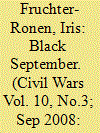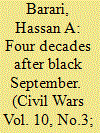|
|
|
Sort Order |
|
|
|
Items / Page
|
|
|
|
|
|
|
| Srl | Item |
| 1 |
ID:
082494


|
|
|
|
|
| Publication |
2008.
|
| Summary/Abstract |
Soon after the 1967 War, the Palestinian Resistance Movements (PRM) which established themselves in Jordan challenged Jordan's authority presenting a military and even existential threat to Hashemite rule. The prestige of the fedayeen as the primary torchbearers of the struggle against Israel rose dramatically following the Karameh Operation of March 1968, which was perceived as a military victory by the PRM and entrenched its legitimacy. The period between the Karameh raid and September 1970 was characterized by the strengthening of the fedayeen organizations and their entrenchment in Jordan by means of the establishment of autonomous military, political, and social institutions. The bloody events of September 1970-July 1971 induced a change in Jordan's official ideological line and marked a significant step in the coalescence of Jordanian national identity. From then on, the particularist trans-Jordanian identity in Jordan was emphasized more explicitly, along with such other attributes of this identity as Bedouin tribal identity, Islamic identity, and Hashemite identity
|
|
|
|
|
|
|
|
|
|
|
|
|
|
|
|
| 2 |
ID:
082493


|
|
|
|
|
| Publication |
2008.
|
| Summary/Abstract |
This article examines how Jordan's position vis-vis the Palestinians has evolved in the aftermath of the military showdown in 1970. Time and again, Jordan sought to speak for the Palestinians at the expense of the Palestinian Liberation Organization (PLO). However, to the chagrin of the Jordanian monarch, the PLO won the battle over representing the Palestinians. Hence, the classical Jordanian school of thought that viewed the occupied territories as part of Jordan, gave way to the emergence of a more assertive school that views the establishment of an independent Palestinian state to be in the best interest of Jordan. For this reason, Jordan digs in its heels and refuses calls for confederation with the Palestinians. Indeed, Jordan has been active in creating a momentum for a two-state solution to bring the Palestinian-Israeli conflict to an end. It remains to be seen, however, how Jordan and the Palestinians will relate in case a two-state solution does not materialize
|
|
|
|
|
|
|
|
|
|
|
|
|
|
|
|
| 3 |
ID:
082495


|
|
|
|
|
| Publication |
2008.
|
| Summary/Abstract |
This article uses a case study of the American University of Beirut (AUB) to investigate which regional events proved the most influential in delineating students' political positions in the years immediately after the 1967 War. In particular, the Israeli attack on the Beirut Airport in December 1968 and the Jordanian assault on the Palestinian fedayeen in Black September of 1970 catalyzed activism around a leftist, progressive, and pro-Palestinian political platform. The most frequent and most passionate protests waged by the students between 1967 and the start of the Lebanese Civil War were against the university administration and the Jordanian government. In the students' view, these actors impeded their freedom of action, speech, and political influence, while guaranteeing that the forces standing behind them, the United States, and Israel, increased their power in the region. The administration and the Jordanian leadership thus provided the prototypes for all the characteristics the students opposed. Conversely, the students saw the actions of the Palestinian fedayeen organizations as not only a means for regaining Palestine but as a program for fighting imperialism in all its guises.
|
|
|
|
|
|
|
|
|
|
|
|
|
|
|
|
| 4 |
ID:
082492


|
|
|
|
|
| Publication |
2008.
|
| Summary/Abstract |
The events of September 1970 in Jordan have enjoyed a variety of definitions, titles and nicknames, the most common being 'Black September' and a 'civil war'. This article endeavours to juxtapose those events with criteria set by the scholarly literature that defines civil wars. It has been found that the events of September 1970 have indeed met the aforementioned criteria and been almost universally acknowledged as a civil war. Nevertheless, the main exceptions to this rule were the two belligerents themselves: the fedayeen organisations and the Jordanian regime. Each, for its own reasons, preferred to construe the bloody encounters as anything but a civil war.
|
|
|
|
|
|
|
|
|
|
|
|
|
|
|
|
|
|
|
|
|